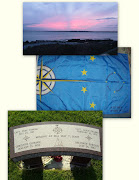American Revolution...........Newport's Participation
During the American Revolution, Newport was the scene of much activity.
One of the signers of the Declaration of Independence, William Ellery, came from Newport. He later served on the Naval Committee. In the winter of 1775 and 1776, the Rhode Island legislature put militia General William West in charge of rooting out loyalists in Newport, and several notable individuals such as Joseph Wanton and Thomas Vernon were exiled to the northern part of the state. In the fall of 1776, the British, seeing that Newport could be used as a naval base to attack New York (which they had recently occupied) took over the city. Because most of the population was pro independence, the British allowed them to leave. The city was repopulated with loyalists and British soldiers. For the next three years, the whole of the Narragansett Bay area became one large battlefield, with Newport being a British fortress.
In the summer of 1778, the Americans began the campaign known as the Battle of Rhode Island. This was the first joint operation between the Americans and the French after the signing of the treaty of alliance. The Americans based in Tiverton, planned a formal siege of the town. However, the French (wanting a frontal assault) refused to take part in the siege. This weakened the American position and the British were able to expel the Americans from the island. The following year, the British, wanting to concentrate their forces in New York, abandoned Newport.
In 1780, French troops sent by King Louis XVI commanded by Rochambeau landed in Newport. For the rest of the war Newport was the base of the French forces in the United States. In July 1781, Rochambeau was finally able to leave Newport for Providence to begin the decisive march to Yorktown, Virginia along with General George Washington. The first Catholic mass in Rhode Island was said in Newport during this time.
By the time the war ended (1783) Newport's population had fallen from over 9,000 (according to the census of 1774) to less than 4,000. Over 200 abandoned buildings were torn down in the 1780s. Also, the war destroyed Newport's economic wealth, as years of military occupation closed the city to any form of trade. The Newport merchants moved away, some to Providence, others to Boston and New York.
It was in Newport in 1791 that the Rhode Island General Assembly, acting under pressure from the merchant community of Providence, voted to ratify the Constitution and become the 13th state.
Subscribe to:
Post Comments (Atom)
The Best Location in Town

F A I R S T R E E T N E W P O R T
MOON GATE at Chateau Sur Mer
A Simple Gateway..enter your secret garden ?
A Special Sunset
the old Christie's....Gone



the richness of the history....too much......d
ReplyDelete